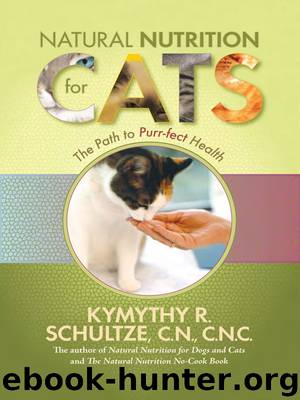Natural Nutrition for Cats by Kymythy Schultze

Author:Kymythy Schultze
Language: eng
Format: epub
Publisher: Hay House, Inc.
Published: 2000-01-01T05:00:00+00:00
CHAPTER 8
Responsibility
“Everything I know I learned from my cat: When you’re hungry eat. When you’re tired, nap in a sunbeam. When you go to the vet’s, pee on your owner.”
— Gary Smith
At this point in my investigative journey to decide what to feed my cats, the commercial, processed petfood products were definitely not coming up roses—or even catnip. But let me state for the record that I don’t think the manufacturers are purposely trying to harm our cats. I don’t think there’s a cigar-smoking executive sitting behind his desk (in a corner office with a big view window) doing a Snidely Whiplash impression while chanting: “I’m going to hurt some kitties today,” followed by evil laughter, of course. No, it’s not that personal—it’s just business. It’s like any other industry that makes billions of dollars every year: The bottom line is the top dollar.
I’m not faulting these companies for trying to make lots of money, but I don’t have to approve of the way they do it. I’m certainly not a fan of animal testing, low-quality ingredients, components that aren’t even appropriate for felines, too-frequent recalls, and questionable marketing tactics. But hey, when it comes down to it, my cat’s health isn’t really their responsibility.
Is my cat’s health my veterinarian’s responsibility? Not really. Yes, I go to vets for their professional opinions, which are very important to me. I respect their experience and education in most areas of animal health. But unless they’ve taken it upon themselves to study animal nutrition in an unbiased forum, they may not be the best source of advice for species-appropriate food for my cats. At veterinary schools, they receive very little education on this subject, and what they do get is mostly taught by employees of the larger petfood companies. The little time devoted to nutrition usually involves the incomplete research we discussed earlier and heavy product pushing—not information about real food.
I have very dear friends who are veterinarians. Through their wisdom and my own experience and research, I’ve come to understand better why vets aren’t always the best source of unbiased nutritional information. You see, when I was studying animal nutrition at Cornell University’s College of Veterinary Medicine a few years ago, only a couple of my professors weren’t paid employees of petfood companies.
I’ll never forget one particular lecture where the teacher/veterinarian was discussing the different forms of petfood products—dry, canned, and so on. While she was talking about the semi-moist products, she mentioned in an offhand way that she would never feed them to her pets. Then she quickly laughed and said, “Oh, my boss would kill me if he heard me say that!”
I didn’t find it amusing. It was painfully clear that she was repeating (except for her slipup) what the petfood company wanted the students to hear—not unbiased information or her actual opinion.
The biggest petfood companies hire brilliant marketers to sell their products. After all, what could be better than having experts (veterinarians) endorse your product? How did this come
Download
This site does not store any files on its server. We only index and link to content provided by other sites. Please contact the content providers to delete copyright contents if any and email us, we'll remove relevant links or contents immediately.
Finding Gobi by Dion Leonard(2845)
Grumpy Cat by Grumpy Cat(2760)
A New Earth: Awakening to Your Life's Purpose by Eckhart Tolle(2654)
The Silkworm by Robert Galbraith(2499)
Tippi by Tippi Hedren(2243)
End of Days by Sylvia Browne(2191)
Total Cat Mojo by Jackson Galaxy(2007)
Backyard Chickens Beyond the Basics by Pam Freeman(1944)
Penguin Bloom by Cameron Bloom(1936)
The Animals Among Us by John Bradshaw(1866)
The Ultimate Pet Health Guide by Gary Richter(1762)
All Things Bright and Beautiful by James Herriot(1758)
The Plant-Based Dog Food Revolution by Mimi Kirk(1713)
Vet in Harness by James Herriot(1706)
Doggy Desserts: 125 Homemade Treats for Happy, Healthy Dogs by Cheryl Gianfrancesco(1685)
Dog Years by Mark Doty(1684)
Cesar's Way by Cesar Millan(1677)
Chicken Soup for the Ocean Lover's Soul by Jack Canfield(1647)
Animal Speak by Ted Andrews(1628)
